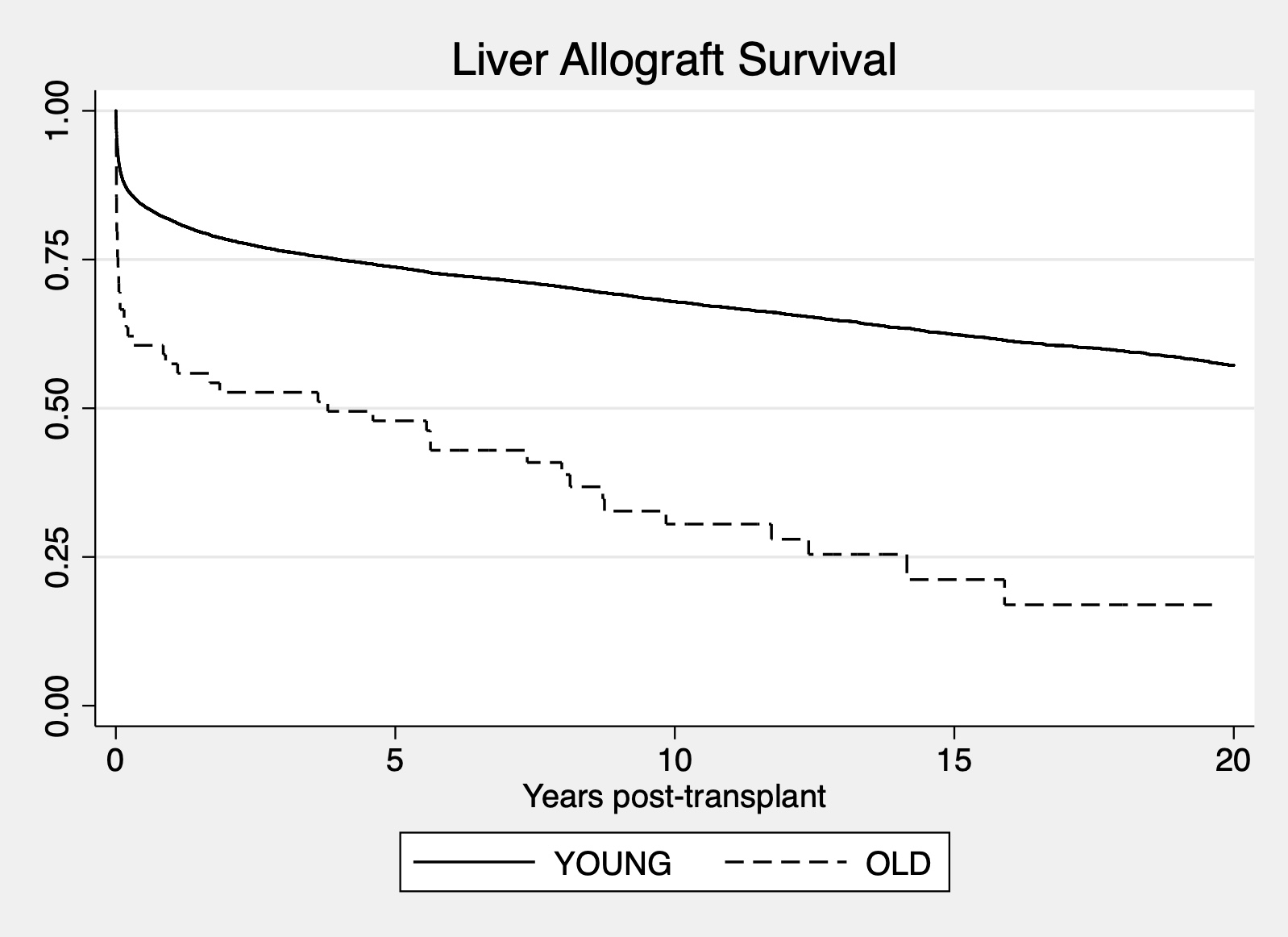Older Livers Should Not Be Utilized in Pediatric Liver Transplantation
UT Southwestern, Dallas, TX
Meeting: 2020 American Transplant Congress
Abstract number: D-144
Keywords: Age factors, N/A, Outcome, Survival
Session Information
Session Name: Poster Session D: Liver: Pediatrics
Session Type: Poster Session
Date: Saturday, May 30, 2020
Session Time: 3:15pm-4:00pm
 Presentation Time: 3:30pm-4:00pm
Presentation Time: 3:30pm-4:00pm
Location: Virtual
*Purpose: Organ scarcity in liver transplantation has required expansion of the acceptable criteria used for donor selection. The utilization of older donors (>60 years) has become common practice in adult liver transplant. We examined outcomes in pediatric liver transplant where recipients received a liver from a donor >60 years in age.
*Methods: The UNOS database was used to identify all pediatric liver transplant recipients (<18 years) transplanted between 1987—2018. Only recipients of solitary, deceased donor organs were included. Pediatric recipients were grouped according to donor age; <60 years (YOUNG) and >60 years (OLD). Donor and recipient demographic data were examined, as were survival and outcomes. A p-value of <0.05 was considered to be significant.
*Results: Of 15,448 pediatric transplants, 71 received an OLD liver while 15,377 received a YOUNG liver. Donors were significantly older in the OLD group (67.3 vs. 11.7 years), with higher BMI (24.1 vs. 19.5 kg/m2), more frequently Caucasian (85.9% vs. 62.6%) and female (62.0% vs. 41.2%) compared with YOUNG donors. Cause of death was frequently a cerebrovascular accident (85.9% vs. 12.5%) in OLD donors. There were no differences in cold ischemia time, biopsy fat content, or transaminases. OLD donors were not DCD donors. Recipients of OLD livers were significantly older (11.3 vs. 5.1 years), had a shorter wait time (23.5 vs. 148.5 days), increased BMI (21.1 vs. 18.3 kg/m2), higher initial and final PELD/MELD scores (34 vs. 12 initial; 31 vs. 14 final). OLD donors were more likely to have used in treatment of fulminant hepatic failure (FHF, 74.7% vs. 35.1%). In addition, recipients of older livers were more likely to be on life support (62.0% vs. 16.6%) or the ventilator (57.8% vs. 13.8%), have had dialysis in the week prior to transplant (9.9% vs. 5.0%) and to have had a previous liver transplant (23.4% vs. 13.8%). Importantly, allograft survival in recipients of OLD livers were found to be significantly diminished when compared to YOUNG livers (Figure 1).
*Conclusions: Pediatric recipients of older liver allografts are significantly sicker than those who receive younger allografts. Allograft survival, however greatly reduced when compared to younger allografts. Use of older liver donors should be avoided, especially in younger or fulminant recipients.
To cite this abstract in AMA style:
MacConmara M, Feizpour C, Aqul A, Desai D, Vagefi P, Hanish S, DeGregorio L, Hwang CS. Older Livers Should Not Be Utilized in Pediatric Liver Transplantation [abstract]. Am J Transplant. 2020; 20 (suppl 3). https://atcmeetingabstracts.com/abstract/older-livers-should-not-be-utilized-in-pediatric-liver-transplantation/. Accessed March 2, 2026.« Back to 2020 American Transplant Congress

